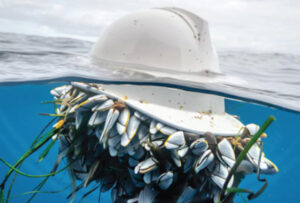Hilary Menos responds to Letters to Katłįà by Linda France, winner of the Michael Marks Environmental Poet of the Year prize 2022-2023, published by the Wordsworth Trust in association with the Michael Marks Awards & the British Library
The Michael Marks Environmental Poet of the Year prize was launched in 2022 to highlight the work of poets writing during the climate crisis and to find poetry that creates insights into the environment and the place of the human within it. The first winner of the prize is Linda France, with her portfolio of poems Letters to Katłįà.
In Letters to Katłįà, Linda France addresses Katłįà Lafferty, a Yellowknives Dene First Nation author and journalist, who was climate writer-in-residence at West Vancouver Memorial Library in British Columbia in 2022. When Katłįà discovered that both she and Linda held posts intended to galvanise new writing and thinking around the climate and ecological emergencies, she contacted Linda and suggested an exchange of letters. Over four months, from her home in Northumberland, Linda wrote poems to Katłįà about what she noticed daily, in her garden, in the weather, in the news, and in her personal life.
The poetry in Letters to Katłįà is a record of change, and of Linda France’s response to that change, and of her strategies for finding and holding on to hope in the face of “the corruption, the looking / away, the brazen destruction – war, greed.” Initially I thought to review the pamphlet, but this felt distant and unhelpful to the real issue, which is surely to discuss what each and every one of us can do to mitigate environmental damage and / or engender fruitful change. So here’s my response, in the form of Letters to Linda.
June, Fête du St. Sacrement.
Dear Linda –
Another bright day in La France Profonde.
I am sitting at my kitchen table
reading Letters to Katłįà again.
The open window admits sky, birdsong
and a breeze – cool in the early morning.
But soon I’ll close the window, haul shut all
the volets on the south face of the house.
We rely on this shutter management –
and our thick stone walls – to keep out the heat.
Two years ago we planted young fruit trees
around the house. Year-old feathered maidens:
apples, pears, chestnuts, cherries, nectarines.
Yesterday I pulled out the ones that died –
more than half due to the bitter winter
and last summer’s record-breaking heatwave.
This spring we installed gutters and downpipes
and a 3000 litre water tank.
I reduced the size of my potager.
Already all my lettuces have failed.
June, Fête des Pères. Afternoon.
Dear Linda –
This morning we drove to Toulouse airport
with our son. Heat shimmered from the tarmac.
The first time we landed here, six years back,
fresh from chilly England, desperate for sun,
twenty eight degrees felt shockingly hot.
Last summer we hit forty four degrees.
2022 was the hottest year
on record in France. There were three heat waves,
lasting more than thirty-three days, and three
further extreme heat events. Thousands died.
Down here we had a hosepipe ban for months.
There were even rumours of a standpipe.
Grapes shrivelled on the vines. Everything slowed.
It was too hot to work in the garden,
or walk far, even early in the day.
Despite this, the mayor trudged from house to house
to check that the old people had water.
One day in July a wheat field caught fire
at the end of our road, a mile from home.
Then another fire, up near the Gresigne,
one of the largest oak forests in France.
It blazed for days. Our beloved Gresigne.
More than 65,000 hectares burned
last year in France, compared to 9,000
on average over the last fifteen years –
and not just in the southern departments
but in the Gironde, Jura, Brittany
– yes, even damp, cool, Brittany with its
endless fields of artichokes and buckwheat.
June, Midsummer’s Day. Evening.
Dear Linda –
You are nearly a thousand miles away,
but I see you clearly in my mind’s eye,
high on your stony fell, cuffed by the wind,
trying to find words to galvanize hope.
The vineyards and lanes I walk every day
are green and golden, gentle and ancient.
We arrived here by chance, and we landed,
as they say, “with our bums in the butter”.
People here feel connected to terroir
– everyone has an uncle with a farm,
a daughter who helps with the grape harvest,
a grand-mère busy in her potager.
Deep down, they’re all paysan(ne)s. I see them fight
to keep what they love, dumping tractor-loads
of manure on the steps of the Mairie,
out on the roundabouts with braziers,
marching the streets playing tinny French pop.
Every French man and woman still carries
an echo of the revolution. They
retain the right to resist. And they do.
This gives me hope – their tight community,
their active defence of this kindly land.
Four other portfolios were commended in the 2022-23 competition; Who Killed the Carolina Parakeet by Dilys Rose, Not Suitable for Motors by Kate Bingham, A Greener Song by Simon Fletcher and Environmental Musings by Megan Jenkins. The 2023-24 competition, judged by Helen Mort, John Aitchison and Jane Caven, is open for entries now – write 150-200 lines on the theme ‘The environment, and the place of the human within it’ and enter here.
We’d like to invite Friday Poem readers to make their feelings about the climate crisis heard. What changes do you see in your local environment? What are you doing about it? And what do you see that gives you hope? Write a poem in the form of a letter to someone, send it to us at editor@thefridaypoem.com and we will publish the best ones.

